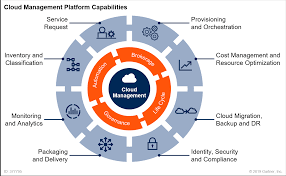Cloud Data Security Program: Safeguarding Your Digital Assets

Cloud computing has revolutionized the way businesses operate, offering unparalleled convenience and scalability. However, with the vast amounts of data being stored and transmitted through the cloud, ensuring its security has become a paramount concern. This is where a robust cloud data security program comes into play. In this article, we will explore the importance of such a program and delve into the intricacies of cloud computing and data security.
In today’s digital landscape, data breaches and cyber attacks have become distressingly common. As businesses increasingly rely on the cloud to store and process sensitive information, the need for a comprehensive cloud data security program cannot be understated. It acts as a shield, safeguarding your organization’s valuable data from unauthorized access, theft, and manipulation.
Cloud computing is the practice of storing and accessing data and programs over the internet instead of on local servers or personal computers. Its benefits are undeniable, from cost savings to increased flexibility. However, this convenience also exposes businesses to potential risks. Data security refers to the protective measures implemented to prevent unauthorized access, data breaches, and other cyber threats.
By implementing a well-designed cloud data security program, you can mitigate these risks and ensure the confidentiality, integrity, and availability of your valuable data. This program encompasses a range of measures, including encryption, access controls, regular monitoring, and employee training. It enables you to proactively identify vulnerabilities, monitor data access, and respond swiftly to any security incidents.
In the next section, we will delve deeper into understanding the key components of a robust cloud data security program. Stay tuned to discover the best practices and considerations that will help you fortify your organization’s data defenses.
Contents
Understanding Cloud Data Security Program

Definition and Purpose of a Cloud Data Security Program
In the digital era, data has become the lifeblood of organizations. Protecting this valuable asset is crucial to maintaining business continuity and customer trust. A cloud data security program refers to a comprehensive strategy and set of protocols designed to secure data stored and processed in the cloud. Its primary purpose is to safeguard sensitive information from unauthorized access, manipulation, and theft.
A cloud data security program encompasses various policies, procedures, and technologies that work in tandem to ensure the confidentiality, integrity, and availability of data. It goes beyond traditional security measures, considering the unique challenges and risks associated with cloud computing. By implementing such a program, organizations can establish a strong defense against cyber threats and comply with regulatory requirements.
Key Components of a Robust Cloud Data Security Program
To build an effective cloud data security program, it is essential to incorporate key components that address the specific risks and vulnerabilities associated with cloud computing. These components include:
1. Data Classification and Sensitivity Assessment
Before implementing security measures, it is crucial to identify the sensitivity of your data and classify it accordingly. This allows you to allocate appropriate security resources and prioritize protection efforts. Conducting a thorough assessment helps determine the level of encryption, access controls, and other security measures required for different types of data.
2. Secure Cloud Service Provider Selection
Choosing a reputable and trustworthy cloud service provider is a critical aspect of a robust security program. Evaluate potential providers based on their security certifications, track record, and data protection measures. Ensure that they offer strong encryption, regular security audits, and robust access controls to safeguard your data.
3. Encryption and Access Controls
Implementing encryption is vital for protecting data stored and transmitted in the cloud. Utilize strong encryption algorithms to secure data at rest and in transit. Additionally, establish stringent access controls to ensure that only authorized individuals can access sensitive information. This includes multifactor authentication, role-based access controls, and privileged user management.
4. Continuous Monitoring and Incident Response
Regular monitoring of data access, system logs, and network activity is essential to detect any suspicious behavior or potential security breaches. Implement automated monitoring tools and establish a robust incident response plan. This enables you to respond swiftly to any security incidents, minimizing the impact and preventing further damage.
By understanding these key components and incorporating them into your cloud data security program, you can establish a strong foundation for safeguarding your organization’s data. In the next section, we will explore the benefits of implementing such a program. Stay tuned to discover how it can enhance your data protection efforts and mitigate security risks.
Benefits of Implementing a Cloud Data Security Program
As businesses navigate the digital landscape, implementing a robust cloud data security program offers numerous benefits that go beyond mere peace of mind. Let’s explore the advantages of having such a program in place.
Enhanced Data Protection and Privacy
A well-designed cloud data security program provides enhanced protection for your valuable data. By implementing encryption techniques, you can ensure that your data remains encrypted both at rest and in transit. This means that even if unauthorized individuals gain access to your data, it will be rendered unreadable and useless without the decryption key. Additionally, access controls can be implemented to limit data access to authorized individuals, further safeguarding your data from internal threats.
Mitigation of Security Risks and Vulnerabilities
Cyber threats are constantly evolving, making it essential to stay one step ahead. A cloud data security program enables you to identify and address security risks and vulnerabilities proactively. Through regular vulnerability assessments and penetration testing, you can identify weak points in your system and take necessary measures to strengthen them. By staying vigilant and proactive, you can significantly reduce the likelihood of data breaches and cyber attacks.
Compliance with Regulatory Requirements
In today’s era of data privacy regulations, compliance is not a choice but a necessity. Implementing a cloud data security program helps you meet regulatory requirements such as the General Data Protection Regulation (GDPR) or the Health Insurance Portability and Accountability Act (HIPAA). By adhering to these regulations, you not only avoid hefty fines but also build trust with your customers by demonstrating your commitment to protecting their sensitive information.
In the following section, we will explore key considerations for developing a robust cloud data security program. Stay tuned to learn how to tailor your program to suit your organization’s specific needs and requirements.
Key Considerations for Developing a Cloud Data Security Program
When it comes to developing a robust cloud data security program, there are several key considerations that must be taken into account. This section will explore these considerations in detail, helping you establish a program that effectively safeguards your organization’s data.
Assessing Data Sensitivity and Classification
To build a strong cloud data security program, it is crucial to assess the sensitivity of your data and classify it accordingly. Not all data requires the same level of protection, so understanding the varying degrees of sensitivity will allow you to allocate resources appropriately. Conduct a thorough evaluation of your data assets, identifying which information is highly sensitive, such as financial records or personal customer data, and which is less critical.
Once you have classified your data, you can apply appropriate security measures based on its sensitivity. This may involve implementing stricter access controls, encryption mechanisms, or additional layers of authentication for highly sensitive data. By tailoring your security measures to the specific needs of each data category, you can optimize your cloud data security program.
Selecting the Right Cloud Service Provider
Choosing the right cloud service provider is paramount to the success of your cloud data security program. Not all providers offer the same level of security, so it is essential to conduct thorough research and due diligence. Look for providers with a strong track record in data security, certifications like ISO 27001 or SOC 2, and a commitment to continuous improvement.
Consider factors such as their data encryption practices, access controls, data backup and recovery procedures, and their ability to comply with industry-specific regulations. Additionally, evaluate their incident response capabilities and their commitment to transparency in case of security breaches. By partnering with a reputable and trustworthy cloud service provider, you can significantly enhance the security of your data in the cloud.
Implementing Encryption and Access Controls
Encryption is a fundamental component of any cloud data security program. By encrypting your data, you render it unreadable to unauthorized individuals, even if they manage to access it. Implement strong encryption algorithms for both data at rest and data in transit, ensuring that your information remains protected at all times.
In addition to encryption, robust access controls are essential for preventing unauthorized access to your data. Implement multi-factor authentication, strong password policies, and role-based access controls to limit access to sensitive information. Regularly review and update these controls to adapt to changing security requirements and to revoke access for employees who no longer need it.
By considering these key factors in developing your cloud data security program, you can establish a solid foundation for protecting your organization’s data. In the next section, we will explore the best practices for maintaining an effective cloud data security program. Stay tuned to learn how to keep your data defenses strong and resilient.
Best Practices for Maintaining an Effective Cloud Data Security Program
Regular Monitoring and Auditing of Data Access
Regular monitoring and auditing play a crucial role in maintaining the security of your cloud data. By closely monitoring data access and user activities, you can swiftly identify any suspicious behavior or unauthorized access attempts. This ensures that any potential security breaches are detected and addressed promptly.
Implementing a robust logging and monitoring system allows you to track user access, modifications, and file transfers within your cloud environment. By analyzing these logs, you can identify patterns, anomalies, and potential security threats. Regularly reviewing and analyzing these logs enables you to proactively respond to any security incidents and take appropriate actions to prevent future breaches.
Employee Training and Awareness Programs
Your employees are an essential part of your cloud data security program. Even with the most advanced security measures in place, human error can still pose a significant risk. Therefore, it is crucial to invest in comprehensive employee training and awareness programs.
Educate your employees about the importance of data security, safe browsing practices, and the potential risks associated with cloud computing. Train them on how to identify and report suspicious activities, such as phishing attempts or social engineering tactics. By fostering a culture of security awareness, you empower your employees to become the first line of defense against potential threats.
Regularly conduct training sessions, workshops, and simulated phishing exercises to keep your employees up to date with the latest security practices and technologies. Encourage open communication channels where employees can report any security concerns or incidents they come across. By continuously reinforcing the importance of data security, you create a vigilant workforce that actively contributes to safeguarding your organization’s valuable data.
Incident Response and Disaster Recovery Planning
Despite your best efforts, security incidents may still occur. Having a well-defined incident response and disaster recovery plan is essential to minimize the impact of such events and ensure business continuity.
Develop a comprehensive incident response plan that outlines the steps to be taken in the event of a security breach. This plan should include clear roles and responsibilities, communication protocols, and escalation procedures. Regularly test and update this plan to ensure its effectiveness and alignment with evolving threats.
Additionally, establish a robust disaster recovery plan that outlines how you will restore operations and recover data in the event of a catastrophic event. Regularly backup your data and store it in secure off-site locations to mitigate the risk of data loss.
By implementing these best practices, you can maintain an effective cloud data security program that prioritizes proactive monitoring, employee awareness, and preparedness for incidents. In the next section, we will explore the future trends in cloud data security, giving you a glimpse into what lies ahead.
Benefits of Implementing a Cloud Data Security Program
When it comes to protecting your organization’s data, implementing a cloud data security program offers a multitude of benefits. Let’s explore some of the key advantages that come with fortifying your data defenses.
Enhanced Data Protection and Privacy
A robust cloud data security program ensures that your sensitive information is shielded from unauthorized access and potential data breaches. By implementing encryption techniques and access controls, you can safeguard your data and maintain its confidentiality. This not only protects your business-critical information but also instills trust in your customers and stakeholders, enhancing your reputation and credibility.
Mitigation of Security Risks and Vulnerabilities
The digital landscape is rife with evolving cyber threats, and the cloud is not exempt from these risks. However, with a well-designed cloud data security program in place, you can proactively identify and address potential vulnerabilities. Regular monitoring, threat assessments, and penetration testing can help you stay one step ahead of cybercriminals, reducing the likelihood of security breaches and their associated costs.
Compliance with Regulatory Requirements
In an era of increasing data privacy regulations, compliance is crucial for businesses across industries. A comprehensive cloud data security program ensures that your organization adheres to regulatory requirements such as the General Data Protection Regulation (GDPR) or the Health Insurance Portability and Accountability Act (HIPAA). By implementing the necessary security measures and controls, you can avoid hefty fines and legal consequences while demonstrating your commitment to protecting sensitive information.
By harnessing the power of a cloud data security program, you can enjoy these benefits and more. In the next section, we will delve into the key considerations you should keep in mind when developing your program. Stay tuned to discover the crucial steps that will help you build a robust defense against data breaches and cyber threats.
Conclusion: So above is the Cloud Data Security Program: Safeguarding Your Digital Assets article. Hopefully with this article you can help you in life, always follow and read our good articles on the website: Cloud.tapchiai.net




